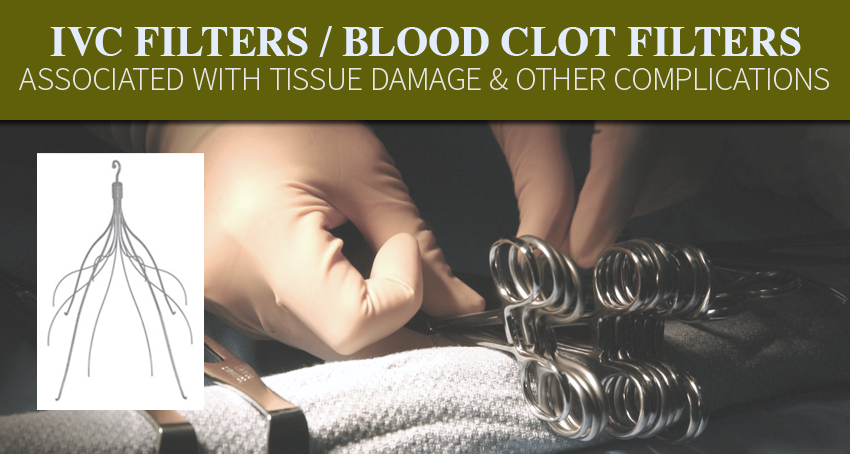An IVC filter is a medical device designed to be inserted into the inferior vena cava, an integral part of the cardiovascular system that carries blood from the lower body to the heart.
When blood clots put people at risk for pulmonary embolism or stroke, in many cases an inferior vena cava filter is inserted into the inferior vena cava in an attempt to catch any migrating blood clots and to prevent any blood clots from reaching the lung.
Monroe Law Group – NO FEES UNLESS YOU WIN You pay nothing until you win your case. Monroe Law Group pays for all costs of the lawsuit up front, and if don’t win, you pay nothing! If we win, you pay a percentage of the awarded settlement. Call us now at 866-308-1092 or email us at intake@monroelawgroup.com for your free no obligation case evaluation.
Pulmonary embolus (PE) remains the leading cause of preventable mortality in surgical patients and the third leading cause of death in hospitalized trauma patients. This has contributed to the 4-fold rise in use of inferior vena cava (IVC) filters following Food and Drug Administration approval of the first retrievable (or optional) IVC filter in 2003.
What are some of the complications associated with IVC filters?
Although IVC filters are efficient at preventing PE, they are associated with an increased risk of venous thrombosis, and other complications including failure to retrieve the devices within the recommended period of time making removal dangerous and the odds of other complications much higher.
- Device is not removed with recommended time period
- Device becomes dangerous or impossible to retrieve
- Perforation of the vena cava or blood vessels
- Migration of the filter to other parts of the body
- Filter fracture
- Filter embolization
- Wrongful death
Why is IVC filter retrieval becoming such a serious concern?
Filter retrieval rates remain less than 50%, with many reports citing an incidence less than 15%. Some reasons for failure of retrieval are related to prolonged indwelling time with associated potential for complications and medical comorbidities, which may also increase the risk of the procedure and/or increase mortality in cases of subsequent PE. However, one of the primary reasons the devices are not being removed is refusal on the part of many physicians. Even though the FDA has recommended the devices be removed, many physicians have deemed it to dangerous to attempt.
According to the Journal of Vascular Surgery, “For patients with retrievable IVC filters in whom
the transient risk of PE has passed, quantitative decision analysis suggests the benefit/risk profile begins to favor filter removal between 29 and 54 days after implantation.”
What does this mean?
To put it simply, any patient that is given a IVC filter as a protective measure against temporary risk for pulmonary embolism and blood clots, essentially anyone that is not at permanent risk for blood clots, should have these devices removed at the most 54 days after their implant. Unfortunately, the majority of these devices that were implanted in patients were not removed and this has created a serious problem. After this 29-54 day window, the devices often become extremely difficult if not impossible to remove safely. In fact, there are a limited number of doctors that are willing to perform these procedures due to the risk associated with the removal. And many patients that wish
A study appearing in April 2013 in JAMA: Internal Medicine suggested that actual retrieval of devices designed to be retrieved occurs in fewer than 15 percent of IVC filter patients.
Unfortunately, many IVC filter recipients have experienced complications with their IVC filters. These complications range from migration of the IVC filter itself, when the spider-like arms intended to catch the blood clots and hold the filter in place ending up failing and the filter is free to move to other areas sometimes piercing veins or other organs such as the lungs or heart.
In some cases the resting place is the heart itself. At other times, the IVC filter has become embedded into the body in ways that it becomes dangerous to impossible for doctors to safely retrieve.
The FDA recently released an alert to physicians who implant inferior vena cava (IVC) filters and clinicians responsible for the ongoing care of patients with these devices recommending that they should remove the devices within a specified period of time to protect against them having complications and keeping removal manageable.
FDA Alert – Removing Retrievable Inferior Vena Cava Filters: FDA Safety Communication
The FDA has received reports of adverse events and product problems associated with IVC filters. Types of reports include device migration, filter fracture, embolization (movement of the entire filter or fracture fragments to the heart or lungs), perforation of the IVC, and difficulty removing the device. Some of these events led to adverse clinical outcomes. These types of events may be related to how long the filter has been implanted. Other known long-term risks associated with IVC filters include lower limb deep vein thrombosis and IVC occlusion. For patients with retrievable filters, some complications may be avoided if the filter can be removed once the risk of pulmonary embolism has subsided. The FDA is concerned that retrievable IVC filters, when placed for a short-term risk of pulmonary embolism, are not always removed once the risk subsides.
Some of the most widely-used IVC filter models include
- C.R. Bard Recovery
- C.R. Bard G2 and G2 Express
- C.R. Bard Eclipse
- C.R. Bard Meridian
- Cook Medical Celect
- Cook Medical Gunther Tulip
Contact Monroe Law Group for assistance with your IVC filter case today
IVC filter lawsuits brought against C.R. Bard and other makers of potentially dangerous blood clot filters allege that the manufacturing companies knew or should have known about the risk of IVC filter side effects, yet failed to provide adequate warnings about this risk to consumers and the medical community. Firms nationwide including Monroe Law Group are accepting IVC Filter cases. If you believe you have been harmed by side effects of a blood clot filter like the Bard Recovery or Bard G2 filter, consult the Monroe Law Group today for legal help. With a qualified IVC filter attorney on your side, you can ensure that your legal rights are protected and seek fair and timely reimbursement for your losses.
Alert: Due to statute of limitations, the time you have to pursue an IVC filter claim is limited. Call us right away at 866-308-1092, email us at intake@monroelawgroup.com, or complete the form on this page now.


